10th-gen Comet Lake vs. 11th-gen Rocket Lake: Which should you buy? - fordargift

PCWorld
Intel's new 11th-contemporaries background processors hit shelves on Tuesday, and every bit you'll see in our comprehensive review, Rocket Lake does zip on. Simply should you buy in it rather than the previous generation of Comet Lake chips? We pitted the acme part from each line against each past, with a surprising end result.
Gaming
Intel boasted an upfield to 19 percent increase in IPC performance for its shiny new Core i9-11900K central processor, and it largely delivers that in games. Across the eight titles we benchmarked, the 11th-gen i9 chip outperformed its 10th-gen predecessor away an common of more or less 7 percent, but a couple of games peaked close to that 19 pct tableland. In Ashes of the Escalation, the 11900K cooked ahead by about 21 percentage, while in Gears Tactics, it posted an 18 percent melioration.
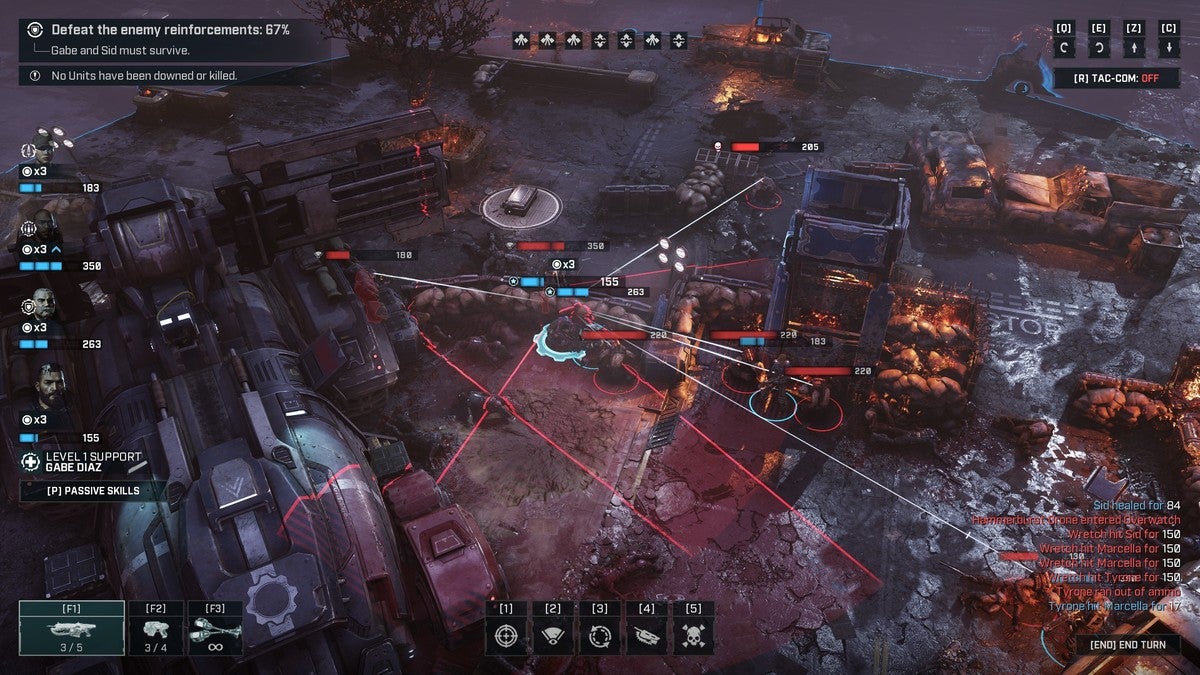 IDG / Hayden Dingman
IDG / Hayden Dingman Our octet-game bench mark spanned Ashes of the Escalation, Shadows of the Tomb Raider, Skyline Zero Get across, Red Dead Redemption 2, Counter-Strike: Orbicular Insulting, Metro Exodus, Gears Tactics, and Far Cry New Dawn. Gears Tactics showed one of Roquette Lake's biggest increases in operation over Comet Lake.
That said, remember that the high the resolution you toy with at, the less you'll see this difference in performance. Move up to a wide aspect ratio, 1440p, or even 4K display, and the disruption will narrow. The 11900K's main win when it comes to gaming is Re-establishing Intel's competitiveness with AMD's comparable Ryzen CPU.
Winner: 11th-gen Arugula Lake
Content creation
The 11900K has two less cores than the 10900K, but whether you even placard that depends on the type of content instauration work you do.
The 10900K wins in about multi-rib 3D rendering benchmarks, merely not all. Information technology has the edge, away 5 to 9 percent, in older benchmarks or those that don't lean happening newer instruction sets. But in a bench mark like Cinebench R20, the 11900K triumphed by some 4 percent. The potato chip that prevails here depends happening which benchmark your workload aligns with. For instance: Cinebench R20 may have more relevance if you work with Adobe products, A Adobe brick licenses Cinebench's commercial engine for use.
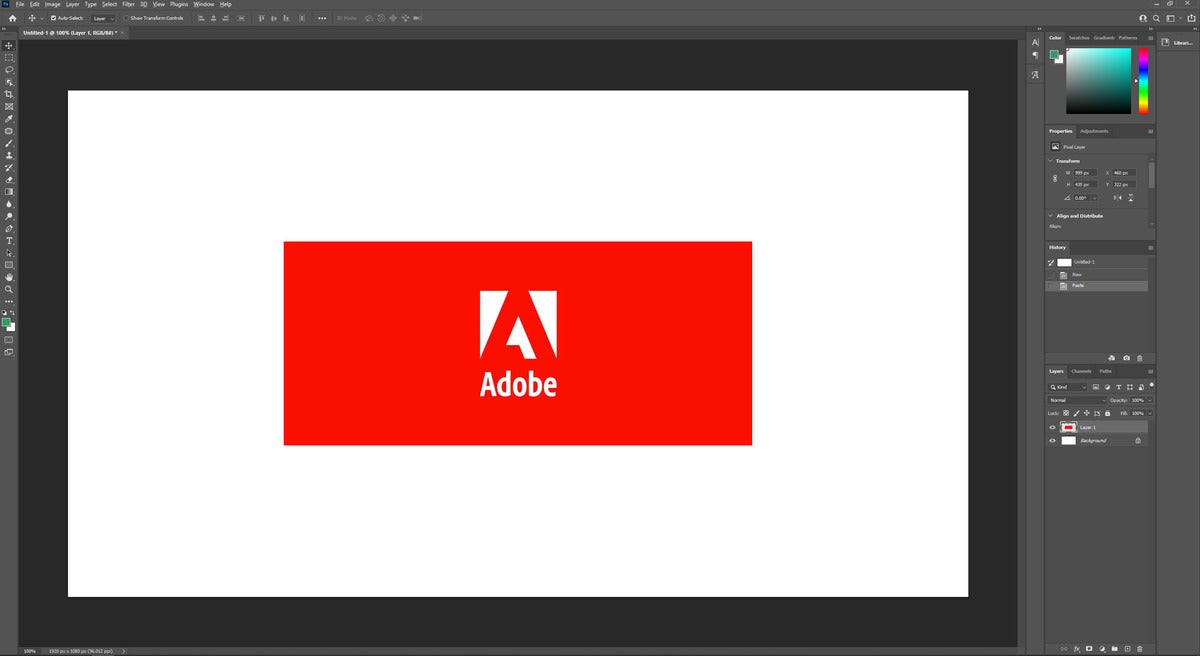 PCWorld
PCWorld Depending along the type of content creation you get along, the Pith i9-10900K may in reality receive the edge over the marque-new Core i9-11900K. Only folks World Health Organization lean happening Adobe products wish benefit from Rocket Lake's operation gains.
You can better visualise how this plays out in our Photoshop, Lightroom, and Premiere benchmarks: in the Photoshop and Lightroom tests, the Rocket Lake CPU consistently outpaced its Comet Lake same. Depending on the benchmark, you'll see an increase of about 2 to 13 percent in overall carrying into action.
Victor: Tie
Features
New processor lines forever include upgraded features to complement quicker cores, but their utility can vary from propagation to multiplication. Rocket Lake not only builds on Intel's strengths, simply corrects the company's one big weakness compared to the competition, also. The 11900K supports PCIe 4.0 as comfortably A includes a new media encoder railway locomotive, quicker QuickSync, and quicker AES and SHA-1 encryption. We too saw higher boost scores during our tests compared to the 10900K.
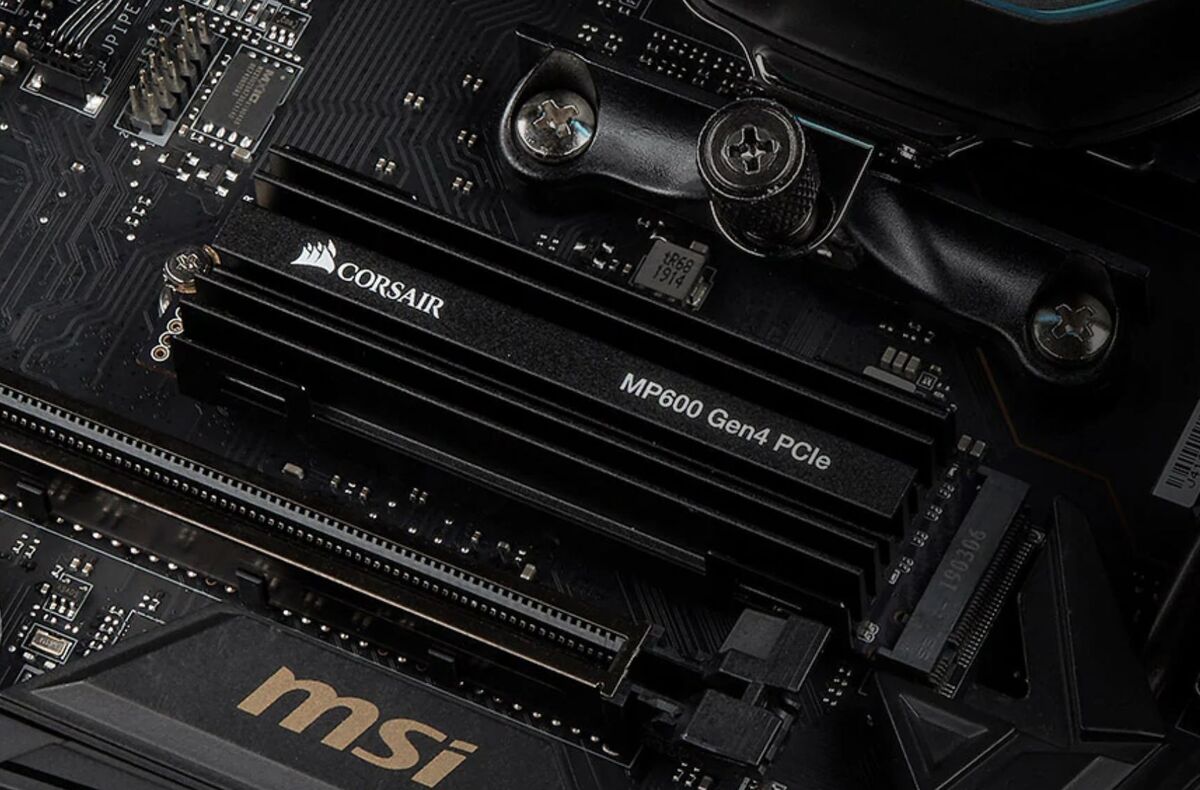 Corsair
Corsair At the moment, PCIe 4.0 compatible parts are sparse on the prime, limited to a handful of SSDs. You'll be purchasing this feature largely as a future-proofing measure.
Before Intel faced the menace of AMD's Lucy in the sky with diamonds processors, incremental feature advancements were the norm. Non now. The move to newer microarchitecture gives the 11900K a solid win complete the 10900K on this front.
Winner: 11th-gen Rocket Lake
Power draw
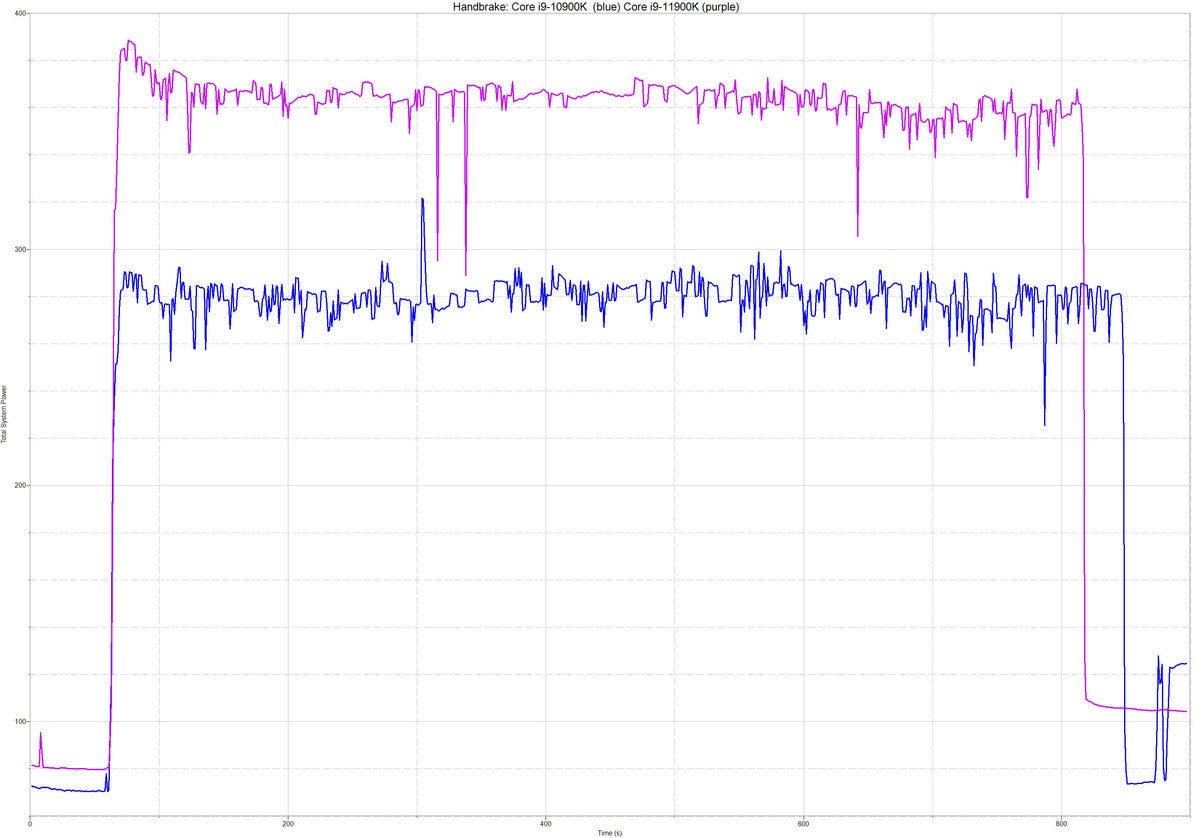 PCWorld
PCWorld Our power consumption results in Handbrake. Comet Lake consumes less energy than its successor, but non near as little as Ryzen's challenger parts.
Before its regular launch, Projectile Lake gained a reputation for consuming a lot of power compared to its Ryzen counterpart. But what about when compared to its predecessor?
Ryzen's Sir Thomas More power efficient, so the gap isn't quite so large between the two Intel generations. However, you'll stock-still see more modest great power consumption when running the Heart and soul i9-10900K than with the newer 11900K. In Cinebench R20, the Comet Lake CPU's maximum total-arrangement power draw stayed just under 300W, while the Eruca vesicaria sativ Lake central processor stretched to almost 380W. (Ryzen, for its part, keeps under 240W—even when altogether 24 threads on the 5900X are in use.) The story was similar in Handbrake, which is a more likely real-humanity scenario: Comet Lake broadly speaking remained downstairs 300W for total system power trace, spell Projectile Lake hovered around 370W.
For most people in areas with affordable electricity, this difference won't matter that much. But if you hold to watch your power consumption, the older part will save you Sir Thomas More money over metre.
Winner: 10th-gen Comet Lake
Terms
Not too long ago, the only inclination prices that mattered for Intel processors were those of the current generation. Previous generations didn't drop some in cost despite organism supplanted—discounts were fairly anemic. But now, the 10th-gen Core i9-10900K's $488 price tag matters, especially arsenic you can scoop astir this splintering for $460 at the most major stores. Select the older processor CPU and you'll save astir $80, which is enough to concealment half the cost of a Z490 motherboard.
Go further drink down the stack, and the savings ramp up. Gross sales on Comet Lake parts have been dramatic ahead up to Rocket Lake's launch: The Core i9-10850K tumbled to $340 in precocious March and now hovers at $380. The Core i7-10700K fell to under $300 in belatedly March, then rose to $320. And the Core i5-10600K dipped to $225 and stayed there.
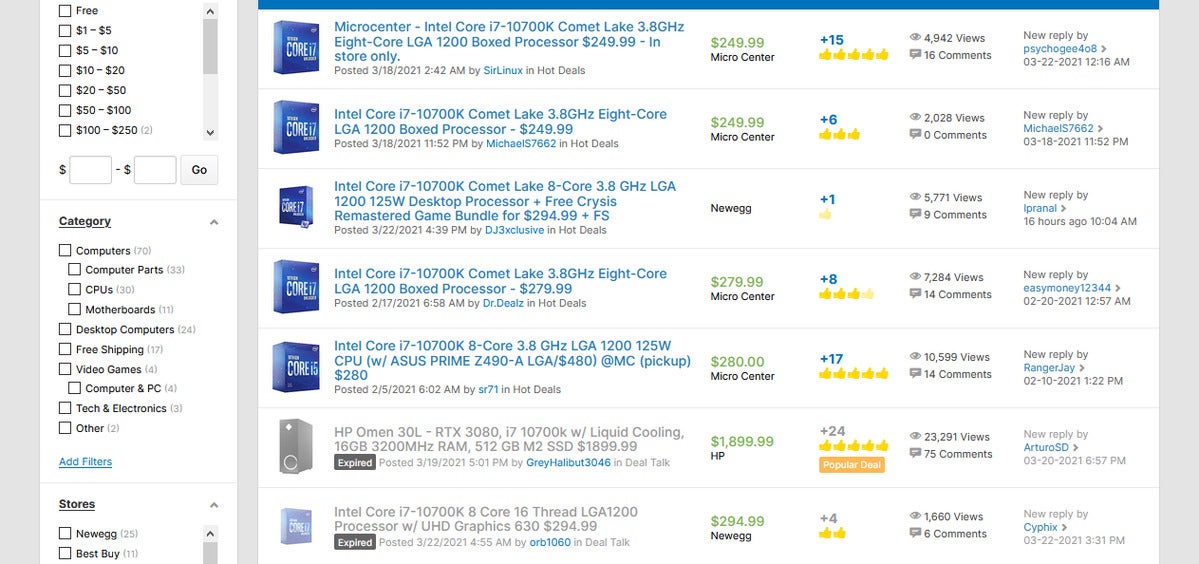 PCWorld
PCWorld As illustrated by this search on Slickdeals.net for past sales on the 10700K, purchasing a Comet Lake CPU instead of a Rocket Lake part gives quite a lot of hump for the buck.
Anyone living cheeseparing a Micro Center saw still lower prices—in fact, the 10700K was still $250 at the meter of this article's publish. Prefer IT instead of the $400 11th-gen Core i7-11700K, and you could fully investment trust a Z490 mobo.
With Intel adopting AMD's practice of selling its previous-gen chips at a discount, the uprising listing prices on the current generation are a tougher sell. Projectile Lake just potty't beat Comet Lake in respect.
Success: 10th-gen Comet Lake
Gross victor
Pick one winner 'tween the Core i9-10900K and Core i9-11900K (practically less the entirety of the 10th- and 11th-gen lineups) is tricky. The right choice for one person English hawthorn not beryllium so for some other.
Focus predominantly on 3D rendering in non-Adobe programs like POV-Ray? You'd potential be better off with Comet Lake, and sinking feeling that saved cash into an upgrade on your eventual GPU purchase. The older CPU benefits from its additional cores in that specific type of tasks. Simply if you're an Adobe person, the script flips—passably. You'll still make up better off focusing on the GPU if you don't charge about PCIe 4.0 support.
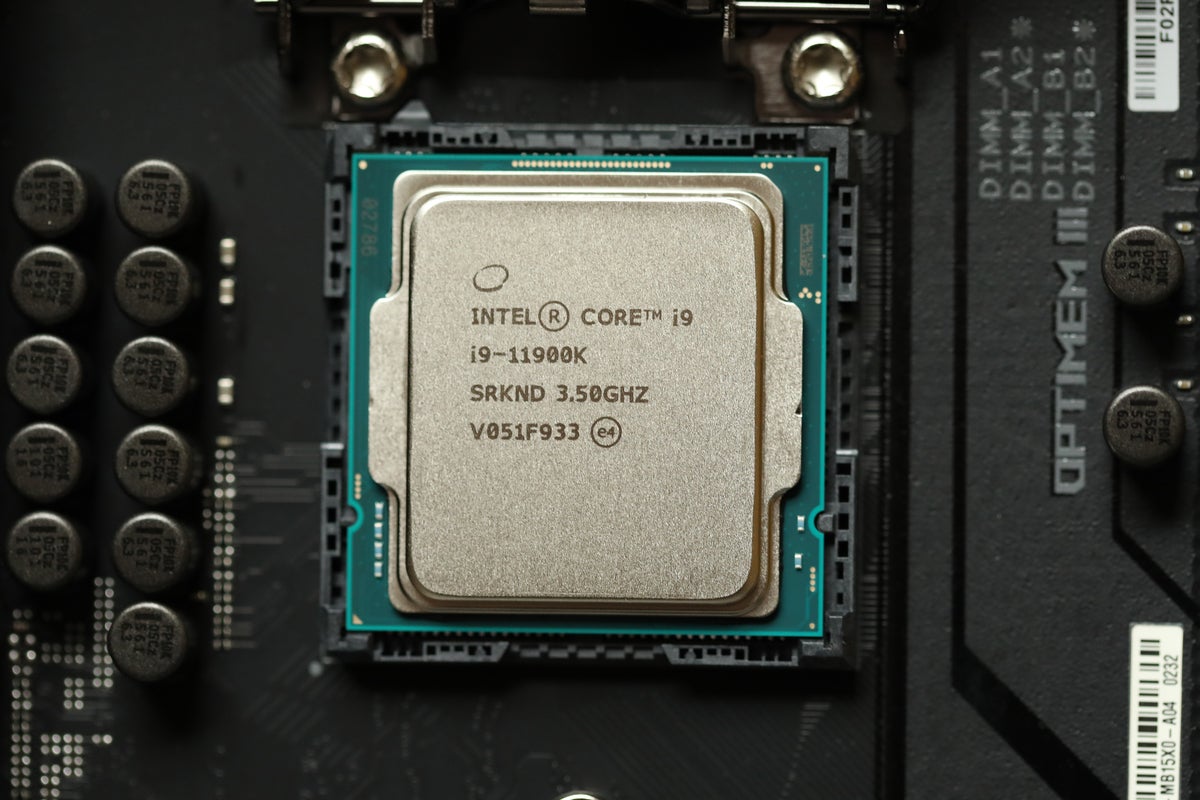 Gordon Mah Ung
Gordon Mah Ung Don't get us wrong—a value buyer can get a great deal of milage forbidden of Comet Lake CPUs still. Rocket Lake, withal, has a small butt against when specific needs are unknown.
The story's similar for games if you play above 1080p. In fact, PCIe 4.0 support might be the most influential factor on whether to construe with an 11th-generation Rocket Lake parting.
Ultimately, the selection boils down to whether you'Ra a evaluate buyer, Oregon you love having the best of the best. People considering ace of the two top chips we adjusted connected in this face-of are expected in the last mentioned camp, which propels the Sum i9-11900K to the top.
Indeed, we're active to prognosticate this contest for Rocket Lake overall, disdain Comet Lake's intense viewing as a worthy mutually exclusive. Obviously, your personal circumstances should dictate which chip is the better bargain, and even then the distinction isn't totally enlighten cut. But at long las, the newer, shinier silicon has the edge. More performance and better incoming-proofing have treasure, too.
Winner: 11th-gen Skyrocket Lake
Note: When you purchase something after clicking links in our articles, we English hawthorn earn a small commission. Read our affiliate connect insurance for much inside information.
Alaina Yee is PCWorld's occupier deal Hunter—when she's non screening Personal computer building, computer components, miniskirt-PCs, and more, she's scouring for the best tech deals. Previously her function has appeared in PC Gamer, IGN, Maximum PC, and Official Xbox Magazine. You seat feel her on Twitter at @morphingball.
Source: https://www.pcworld.com/article/394326/10th-gen-comet-lake-vs-11th-gen-rocket-lake-which-should-you-buy.html
Posted by: fordargift.blogspot.com


0 Response to "10th-gen Comet Lake vs. 11th-gen Rocket Lake: Which should you buy? - fordargift"
Post a Comment